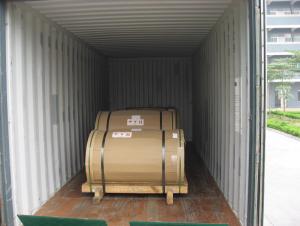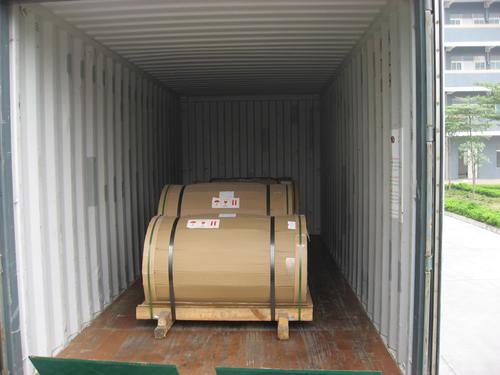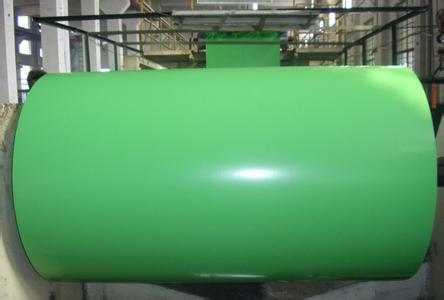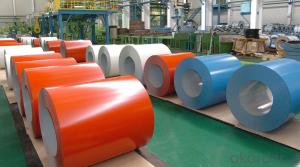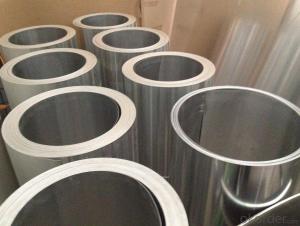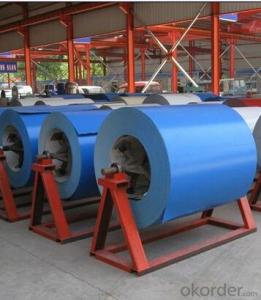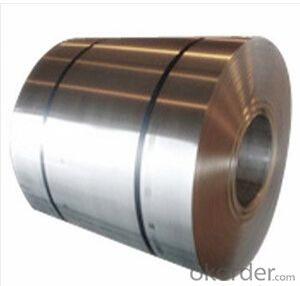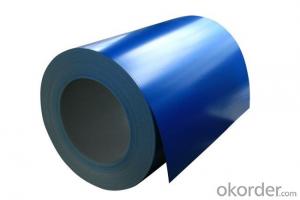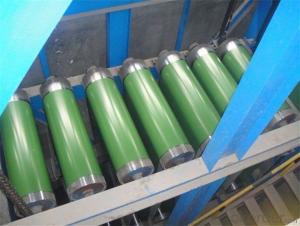Gentek Aluminum Coil - Prepainted Aluminum Coils for Construction
- Loading Port:
- Shanghai
- Payment Terms:
- TT or LC
- Min Order Qty:
- 5 m.t.
- Supply Capability:
- 10000 m.t./month
OKorder Service Pledge
OKorder Financial Service
You Might Also Like
Specification
1.Structure of Prepainted Aluminum Coils Used for Construction Description
Prepainted Aluminum Coils Used for Construction are of a wide range of colors, which give wonderful appearance no matter in residential and commercial constructions or great exhibition centers.
Prepainted Aluminum Coils Used for Construction have been widely used in the fields of construction and decoration, electronic applications, lighting decoration, air-condition air pipes, sandwich panels and drainages etc.
2.Main Features of Prepainted Aluminum Coils Used for Construction
• Superior quality of raw material
• Reasonable and stable chemical composition
• Accurate tolerance
• Goode mechanical property
3.Prepainted Aluminum Coils Used for Construction Images
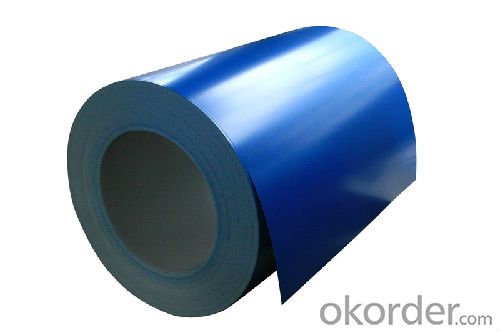
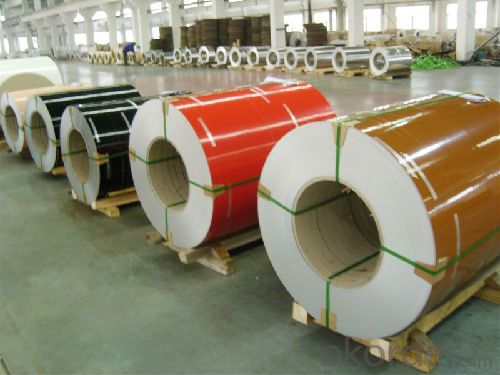
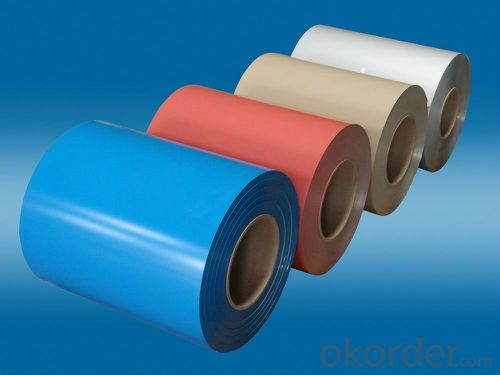
4.Prepainted Aluminum Coils Used for Construction Specification
| Alloy | AA1xxx,AA3xxx,AA5xxx |
| Temper | H14,H16,H18,H22,H24,H26,H32,O/F |
| Thickness | 0.03mm--3mm |
| Width | 30mm--1700mm |
| Coating | PE/PVDF/Epoxy |
| Standard | GB/T 17748-1999 |
5. FAQ of Prepainted Aluminum Coils Used for Construction
A.How to guarantee the quality?
Customers are welcome to our mill to visit and check the products. Besides, we can arrange a third party to test Prepainted Aluminum Coils Used for Construction.
B. Now which countries do you export your goods?
Now we export to South East Asia,Africa, North America,South America ect.
- Q: How are aluminum coils cleaned and maintained?
- Aluminum coils are commonly used in HVAC systems and refrigeration units, and it is essential to clean and maintain them regularly to ensure optimal performance and efficiency. Here is a step-by-step guide on how to clean and maintain aluminum coils: 1. Safety first: Before starting any cleaning process, ensure that the power to the HVAC system or refrigeration unit is turned off to avoid any accidents. 2. Remove debris: Begin by removing any visible debris, such as leaves, dirt, or dust, from the aluminum coils. Use a soft brush or a vacuum cleaner with a brush attachment to gently remove the debris. 3. Spray cleaning solution: Prepare a cleaning solution by mixing a mild detergent or coil cleaner with water. Follow the instructions on the product label to achieve the correct dilution ratio. Transfer the solution into a spray bottle. 4. Apply the cleaning solution: Spray the cleaning solution onto the aluminum coils, ensuring that all areas are covered. Allow the solution to sit for a few minutes to loosen any dirt or grime. 5. Scrub the coils: Use a soft brush or a coil cleaning brush to scrub the aluminum coils gently. Be cautious not to apply excessive pressure, as it may damage the delicate fins on the coils. Focus on areas with stubborn dirt or buildup. 6. Rinse with water: After scrubbing, rinse the aluminum coils thoroughly with clean water. A hose or a pressure washer on a low setting can be used to ensure all the cleaning solution and dirt are removed. Ensure that the water flows in the opposite direction of the airflow to avoid pushing debris further into the coils. 7. Check for any damage: While cleaning, inspect the aluminum coils for any signs of damage, such as bent fins or leaks. If any issues are found, it is recommended to contact a professional technician for repairs. 8. Allow to dry completely: After rinsing, allow the aluminum coils to air dry completely before turning the power back on. This will prevent any moisture-related issues and ensure the coils are ready for use. 9. Maintain a regular cleaning schedule: To keep the aluminum coils in excellent condition, it is crucial to establish a regular cleaning schedule. Depending on the usage and environmental factors, cleaning every three to six months is generally recommended. However, if the coils are installed in a highly polluted or dusty area, more frequent cleaning may be required. By following these steps and maintaining a regular cleaning schedule, you can ensure that your aluminum coils remain clean, efficient, and in optimal working condition.
- Q: 1mm how much is one square meter for aluminum rolls?
- The price of aluminum sheet is calculated according to the price of aluminum ingot + processing fee (aluminum plate state), and the specific price is also different according to the size and size of aluminum sheet.
- Q: We want to buy an AirBake insulated aluminum pizza pan. What is insulated aluminum? We want to make sure that it is not something toxic like the non-stick material on pans.
- AirBake is available either natural (just plain aluminum) or nonstick, which is coated with a similar material to other nonstick cookware. What's insulated about it is this: The pan is actually two layers separated by an air pocket. If you put it directly over a heating element, the lower layer heats the air inside, which heats the upper layer. A single-ply aluminum sheet will get very hot and tend to burn the pizza, because it absorbs radiant energy from the element more quickly than the pizza can conduct it away. The insulating air layer slows down the heat transfer and helps to keep your pizza from burning. So if you prefer non-non-stick cookware, get the AirBake Natural line.
- Q: Can aluminum coils be used for window frames?
- Yes, aluminum coils can be used for window frames. Aluminum is a popular choice for window frames due to its durability, lightweight nature, and resistance to corrosion. It is commonly used in both residential and commercial applications. Aluminum coils can be easily shaped and manipulated to fit various window sizes and styles. Furthermore, aluminum frames offer excellent thermal insulation properties, which can help improve energy efficiency in buildings. Overall, aluminum coils are a reliable and practical option for window frame construction.
- Q: Can aluminum coils be used for decorative purposes?
- Aluminum coils offer a multitude of possibilities when it comes to decoration. This versatile material can be easily molded and adjusted, making it ideal for a wide range of decorative uses. In industries like architecture, interior design, and automotive design, aluminum coils are frequently employed to create decorative trims, accents, and borders. To further enhance their visual appeal and match the desired aesthetic, these coils can be painted or coated with different finishes. Moreover, thanks to their lightweight nature and durability, aluminum coils are a popular choice for outdoor decorative purposes, such as garden ornaments, sculptures, and signage. Ultimately, incorporating aluminum coils into various projects provides a cost-effective and visually pleasing solution for adding decorative elements.
- Q: What is the typical thickness of aluminum coils?
- The intended use and application of aluminum coils can result in varying thicknesses. Generally, a range of thicknesses is accessible, spanning from 0.006 inches (0.15 mm) to 0.25 inches (6.35 mm). The specific thickness needed for a specific project or industry hinges on factors like desired strength, flexibility, and weight of the aluminum coils.
- Q: Can aluminum coils be used in chemical processing plants?
- Yes, aluminum coils can be used in chemical processing plants. Aluminum is a versatile and widely used material in various industries, including chemical processing. It has excellent corrosion resistance properties, which make it suitable for handling and transporting various chemicals. Aluminum coils can be used in heat exchangers, condensers, evaporators, and other equipment in chemical processing plants. Additionally, aluminum coils offer lightweight and high thermal conductivity, which allows for efficient heat transfer and energy savings. However, it is important to consider the specific requirements and compatibility of the chemicals being processed to ensure that aluminum coils are suitable for the intended application.
- Q: What are the maximum operating temperatures for aluminum coils?
- The specific alloy and application used can determine the maximum operating temperatures for aluminum coils. In general, aluminum coils can endure high temperatures without significant degradation or performance problems. Common aluminum alloys like 3003 and 5052 have a maximum operating temperature of approximately 300-400 degrees Fahrenheit (150-200 degrees Celsius). These temperatures are suitable for most industrial and commercial uses, including HVAC systems, refrigeration units, and heat exchangers. Specialized aluminum alloys, such as 4004 and 4343, are designed for high-temperature applications. These alloys can withstand temperatures up to 550-650 degrees Fahrenheit (290-340 degrees Celsius) without significant structural or performance damage. It's important to note that the maximum operating temperature can vary depending on factors like coil thickness, heat transfer conditions, and duration of exposure to high temperatures. Therefore, it is advisable to consult the manufacturer's guidelines or perform temperature tests to determine the safe operating limits for a specific aluminum coil in a particular application.
- Q: How do aluminum coils contribute to the insulation properties of products?
- Aluminum coils play a crucial role in enhancing the insulation properties of various products. The use of aluminum coils in insulation systems improves thermal efficiency, minimizes heat transfer, and reduces energy consumption. Firstly, aluminum is an excellent conductor of heat and electricity. This characteristic allows aluminum coils to effectively distribute and dissipate heat, preventing the transfer of thermal energy from one side of the product to another. By doing so, aluminum coils act as a barrier, minimizing heat loss or gain, which is essential for maintaining optimal temperatures in different applications. Secondly, aluminum coils have a low thermal conductivity. This means that they are not easily affected by temperature changes and do not readily transfer heat. As a result, products containing aluminum coils can better resist external temperature fluctuations, providing better insulation against hot or cold conditions. Furthermore, aluminum coils are lightweight, making them easy to handle and install in various products. This lightweight property is advantageous as it does not add significant weight to the overall structure, making it suitable for industries that require portable or lightweight insulation solutions. Moreover, aluminum is highly resistant to corrosion, making it ideal for applications in humid or corrosive environments. This durability ensures that the insulation properties of products containing aluminum coils remain effective over an extended period, without deteriorating or compromising performance. Additionally, aluminum is a recyclable material, which aligns with sustainable practices. Using aluminum coils in insulation products promotes environmental consciousness by reducing waste and energy consumption associated with manufacturing new materials. In summary, aluminum coils contribute to the insulation properties of products by efficiently distributing and dissipating heat, minimizing heat transfer, and resisting temperature fluctuations. Their lightweight nature, durability, and recyclability further enhance their effectiveness as an insulation component. Overall, aluminum coils are a valuable addition to insulation systems, improving thermal efficiency and reducing energy consumption.
- Q: What are the various classifications of aluminum coil grades?
- <p>Aluminum coils are classified into different grades based on their composition and properties. The most common grades include 1000 series (99% pure aluminum), 3000 series (aluminum-manganese alloys), 5000 series (aluminum-magnesium alloys), and 6000 series (aluminum-silico-magnesium alloys). Each series has specific characteristics, such as corrosion resistance, formability, and strength, which determine their suitability for various applications like construction, transportation, and packaging. Additionally, there are 2000 series (aluminum-copper alloys), 4000 series (aluminum-silicon alloys), 7000 series (aluminum-zinc-magnesium alloys), and 8000 series (other alloys), each with unique properties and applications.</p>
Send your message to us
Gentek Aluminum Coil - Prepainted Aluminum Coils for Construction
- Loading Port:
- Shanghai
- Payment Terms:
- TT or LC
- Min Order Qty:
- 5 m.t.
- Supply Capability:
- 10000 m.t./month
OKorder Service Pledge
OKorder Financial Service
Similar products
Hot products
Hot Searches
Related keywords
